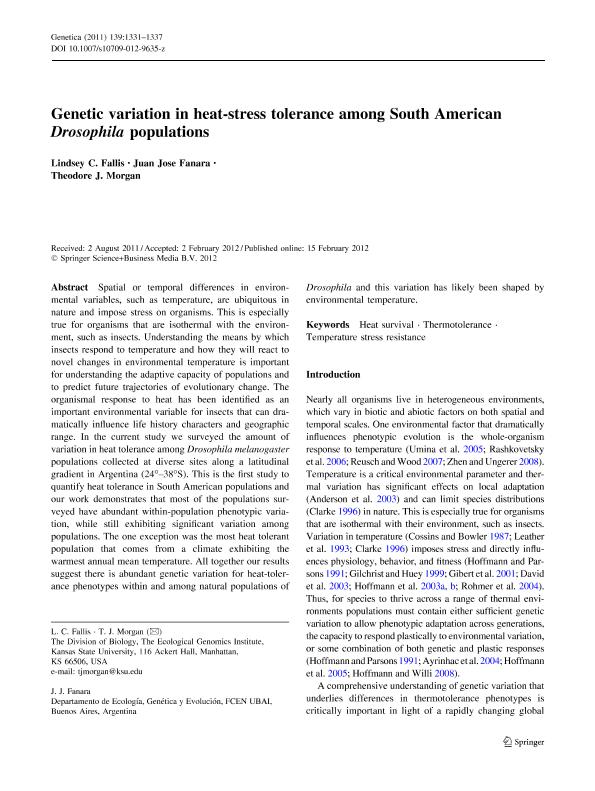Mostrar el registro sencillo del ítem
dc.contributor.author
Fallis, Lindsey C.
dc.contributor.author
Fanara, Juan Jose

dc.contributor.author
Morgan, Theodore J.
dc.date.available
2019-01-25T20:28:33Z
dc.date.issued
2011-10
dc.identifier.citation
Fallis, Lindsey C.; Fanara, Juan Jose; Morgan, Theodore J.; Genetic variation in heat-stress tolerance among South American Drosophila populations; Springer; Genetica; 139; 10; 10-2011; 1331-1337
dc.identifier.issn
0016-6707
dc.identifier.uri
http://hdl.handle.net/11336/68660
dc.description.abstract
Spatial or temporal differences in environmental variables, such as temperature, are ubiquitous in nature and impose stress on organisms. This is especially true for organisms that are isothermal with the environment, such as insects. Understanding the means by which insects respond to temperature and how they will react to novel changes in environmental temperature is important for understanding the adaptive capacity of populations and to predict future trajectories of evolutionary change. The organismal response to heat has been identified as an important environmental variable for insects that can dramatically influence life history characters and geographic range. In the current study we surveyed the amount of variation in heat tolerance among Drosophila melanogaster populations collected at diverse sites along a latitudinal gradient in Argentina (24°-38°S). This is the first study to quantify heat tolerance in South American populations and our work demonstrates that most of the populations surveyed have abundant within-population phenotypic variation, while still exhibiting significant variation among populations. The one exception was the most heat tolerant population that comes from a climate exhibiting the warmest annual mean temperature. All together our results suggest there is abundant genetic variation for heat-tolerance phenotypes within and among natural populations of Drosophila and this variation has likely been shaped by environmental temperature.
dc.format
application/pdf
dc.language.iso
eng
dc.publisher
Springer

dc.rights
info:eu-repo/semantics/openAccess
dc.rights.uri
https://creativecommons.org/licenses/by-nc-sa/2.5/ar/
dc.subject
Heat Survival
dc.subject
Temperature Stress Resistance
dc.subject
Thermotolerance
dc.subject.classification
Otras Ciencias Biológicas

dc.subject.classification
Ciencias Biológicas

dc.subject.classification
CIENCIAS NATURALES Y EXACTAS

dc.title
Genetic variation in heat-stress tolerance among South American Drosophila populations
dc.type
info:eu-repo/semantics/article
dc.type
info:ar-repo/semantics/artículo
dc.type
info:eu-repo/semantics/publishedVersion
dc.date.updated
2019-01-25T13:34:47Z
dc.journal.volume
139
dc.journal.number
10
dc.journal.pagination
1331-1337
dc.journal.pais
Alemania

dc.journal.ciudad
Berlin
dc.description.fil
Fil: Fallis, Lindsey C.. Kansas State University; Estados Unidos
dc.description.fil
Fil: Fanara, Juan Jose. Consejo Nacional de Investigaciones Científicas y Técnicas. Oficina de Coordinación Administrativa Ciudad Universitaria. Instituto de Ecología, Genética y Evolución de Buenos Aires. Universidad de Buenos Aires. Facultad de Ciencias Exactas y Naturales. Instituto de Ecología, Genética y Evolución de Buenos Aires; Argentina. Universidad de Buenos Aires. Facultad de Ciencias Exactas y Naturales. Departamento de Ecología, Genética y Evolución; Argentina
dc.description.fil
Fil: Morgan, Theodore J.. Kansas State University; Estados Unidos
dc.journal.title
Genetica

dc.relation.alternativeid
info:eu-repo/semantics/altIdentifier/doi/https://doi.org/10.1007/s10709-012-9635-z
dc.relation.alternativeid
info:eu-repo/semantics/altIdentifier/url/https://link.springer.com/article/10.1007%2Fs10709-012-9635-z
Archivos asociados
